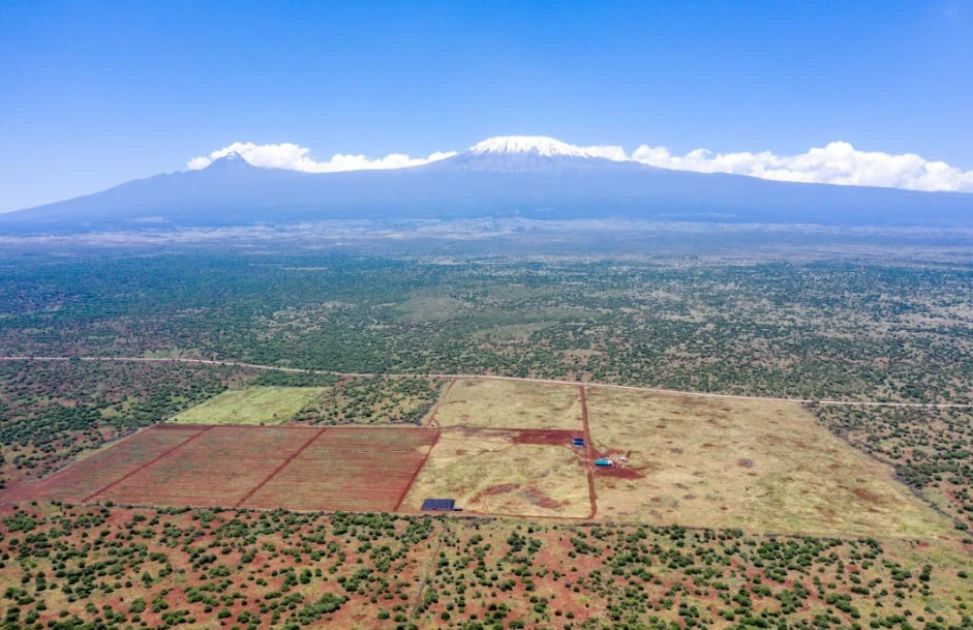Kajiado avocado farm suffers blow in court tussle with Amboseli wildlife conservationists

Aerial view of the Kiliavo Farm in Kajiado.
The Court of Appeal in Nairobi on Friday last week sent back to the drawing board a 180-acre farm investor in a heated legal tussle with Amboseli wildlife conservationists for overlooking legal redress procedures.
KiliAvo Fresh Limited moved to the appellate court to contest
a decision by the Environmental and Land Court in Kajiado that pronounced
itself as not legally fit to hear and determine a judicial review case against the
National Environment Tribunal (NET) which upheld the National Environmental
Management Authority (NEMA)’s order to suspend its farming activities in
Kajiado.
According to the appellate three-judge bench, the Kajiado court
did not err when it declined to conduct the judicial review in a case decided
by the NET against NEMA on the basis of an overlooked legal procedure by the
farm.
“In the circumstances of this appeal, we find that the judicial
review proceedings were not the route to go. No exceptional circumstance was
demonstrated by the appellant as to why judicial review proceedings was the
preferred mode to resolve its complaint when there was a statutorily laid down
procedure,” read the judgement in part.
The three judges maintained that if the farm was aggrieved by NET
in dismissing the appeal, there is an appealable act.
If it was considered that NET was demonstrably wrong, or had
misdirected itself, or had acted on irrelevant considerations or failed to
consider relevant factors, thereby leading to a plainly wrong outcome, the
remedy provided by the Act is to appeal the decision at the High Court instead
of filing judicial review proceedings.
“Instead, it filed a judicial review application. It has been
emphasized many times before that aggrieved parties should strictly follow any
procedures for dispute resolution that have been prescribed by the law,” read
the judgement.
KiliAvo Fresh Limited has for close to 5 years fought to
survive following an order by NEMA to revoke its license barely a month after
issuance.
It is KiliAvo's case that NEMA issued them with
an Environment Impact Assessment (EIA) licence on August 6, 2020 that was a
green light indicator for operation.
But before the dust settled, through notices to show cause
dated 9th and 18th September 2020, NEMA threatened to cancel their EIA
licences.
The investor was aggrieved by the notices and lodged an appeal
to the NET stating that NEMA had, among other things, ordered and directed it to
stop any further development on the suit properties.
The notices are said to have been occasioned by various
complainants who were objecting to the EIA licence on the basis that the
KiliAvo Fresh Limited project was within a zoned wildlife corridor and thus
violated the provisions of the Amboseli Ecosystem Management Plan (AEMP).
The notices argued that the Amboseli is a fragile ecosystem
and that the local plan of the Amboseli Land Owners Conservancies Association
(ALOCA) had zoned areas for conservation and livestock grazing in line with AEMP
and thus the proposed project violated the provisions of the plan which had
been endorsed by all stakeholders and gazetted under the Wildlife Act, 2015.
They also stated that key stakeholders had not been consulted during the EIA
approval process.
Further, KiliAvo avers that it conducted a successful
Environmental Impact Assessment (EIA) which had been preceded by the appropriate
applications and consultations with the relevant stakeholders, who were advised
as to the nature, scope, and extent of the project, as well as the benefits the
project sought to bring in the subject area and there were no objections.
After the approvals, the investor claims to have carried out a
great financial investment that includes: fencing off the suit properties;
commissioning two boreholes that had to be sunk; employing at least 300 locals;
preparing the farm beds and planting the seedlings for the growing of the
highest quality of organic fruits and vegetables for sale within Kenya and
beyond.
The company holds that it was undertaking an integrated
mixed-use farm comprising of conservation agriculture, livestock production,
wildlife rangers base, and necessary farm infrastructure.
However, wildlife conservationists around Amboseli accused the
farm of infringing on wildlife rights by blocking wildlife corridors, adding
that the farm would use excess water for irrigation hence the wildlife will go
thirsty.
The court battle has escalated and dragged in various agencies
among them: the National Environment Tribunal, the Conservation Alliance, Big Life
Foundation, the National Environmental Management Authority, and the County
Government of Kajiado.
The 180-acre farm is located between Amboseli National Park
and a series of other protected areas including the Kimana Sanctuary, Tsavo
West National Park, and Chyulu Hills National Park.
It is surrounded by locally-owned conservancies where landowners
- hundreds of local Maasai - earn their living from livestock and tourism.
The Court of Appeal’s decision renders operations grounded at
the Kiliavo Kajiado farm.
The farm however, may once again appeal against the cancellation of their licence at the Supreme Court.
Want to send us a story? SMS to 25170 or WhatsApp 0743570000 or Submit on Citizen Digital or email wananchi@royalmedia.co.ke
Comments
No comments yet.


Leave a Comment